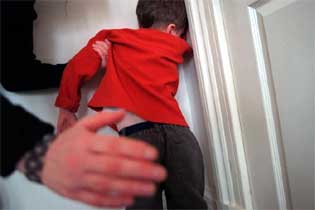NEARLY half of all Scottish parents of toddlers believe smacking their children is necessary to discipline them.
A Scottish Executive study, Growing Up In Scotland, revealed that 42 per cent agreed or strongly agreed with the statement: "It may not be a good thing to smack, but sometimes it is the only thing that will work." Thirty per cent of babies' parents also agreed with the statement.
The findings come a week after The Scotsman revealed that a UN watchdog is preparing a report that will criticise the Executive for failing to outlaw smacking.
The parents of around 8,000 children aged up to three were questioned for the study, which will track the children's lives into their teens.
Robert Brown, the deputy education minister, said the ambitious study will help the Executive to plan policy.
He said: "We want all youngsters to get the best possible start in life. The information will help ensure that future generations grow up in safe, supportive environments and have every opportunity to realise their full potential."
Last night, child-welfare campaigners said they were concerned that so many parents find smacking acceptable.
Tom Roberts, the head of public affairs at Children 1st, described the figures as "extremely worrying" and said: "Extensive data has shown that children who are frequently hit develop more behavioural problems, particularly aggression, as well as emotional and mental-health problems."
The Executive backtracked from a plan five years ago to ban smacking children under three after complaints from parents and warnings the law would be unenforceable. It outlawed hitting with an implement such as a belt, slipper or cane.
Scotland, the early years: the trials and tribulations of being born here
DRINKING
Mothers living in more deprived areas were less likely to say they drank while pregnant than those in less deprived areas. Sixty-five per cent of mothers in the latter group never drank alcohol while pregnant, compared to 82 per cent in the most deprived.
SMOKING
About one in four mothers said they smoked during pregnancy - 42 per cent were in the most-deprived areas, compared with 9 per cent in the least-deprived. Of those who smoked in pregnancy, half said they smoked "most days" and half "occasionally".
BIRTH
A quarter of Scots mothers said they had a Caesarian section, but the figures suggest it was not because they were "too posh to push". Only 12 per cent had the C-section before labour began, while 13 per cent chose to do so once the baby was on the way.
GRANDPARENTS
Four per cent of children had five or more grandparents, indicating a rise in the number of so-called "blended families", where the parents of step-mothers and fathers can act as grandparents. Most children in the survey had at least one grandparent.
PREGNANCIES
Sixty per cent of pregnancies were described as planned, but the survey stresses that this does not mean the rest were unwanted. Although 23 per cent were not planned at all, 17 per cent said they did not do anything to prevent it happening.
TELEVISION
The survey suggests that the television is often used as a surrogate baby-sitter when parents have their hands full. More than half of babies (53 per cent) had watched TV in the past week, as had 95 per cent of the toddlers covered in the research.
HOUSEWORK
Equality of the sexes is still a long way off when it comes to housework. The majority of household tasks, such as cooking, ironing and cleaning, were carried out by the mother, even when both parents worked for more than 16 hours a week.
BREASTFEEDING
Around 60 per cent of children were breastfed. Those living in the least-deprived areas were twice as likely to have been as those in disadvantaged areas. The survey says "challenges remain" in promoting breastfeeding among the more deprived groups.
CHILDCARE
A quarter of parents found meeting childcare costs difficult or very difficult. Costs vary considerably across the country, the research found, suggesting that the demand for affordable and available childcare has not been met.
Source: The Scotsman


No comments:
Post a Comment